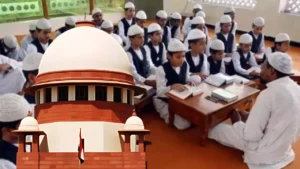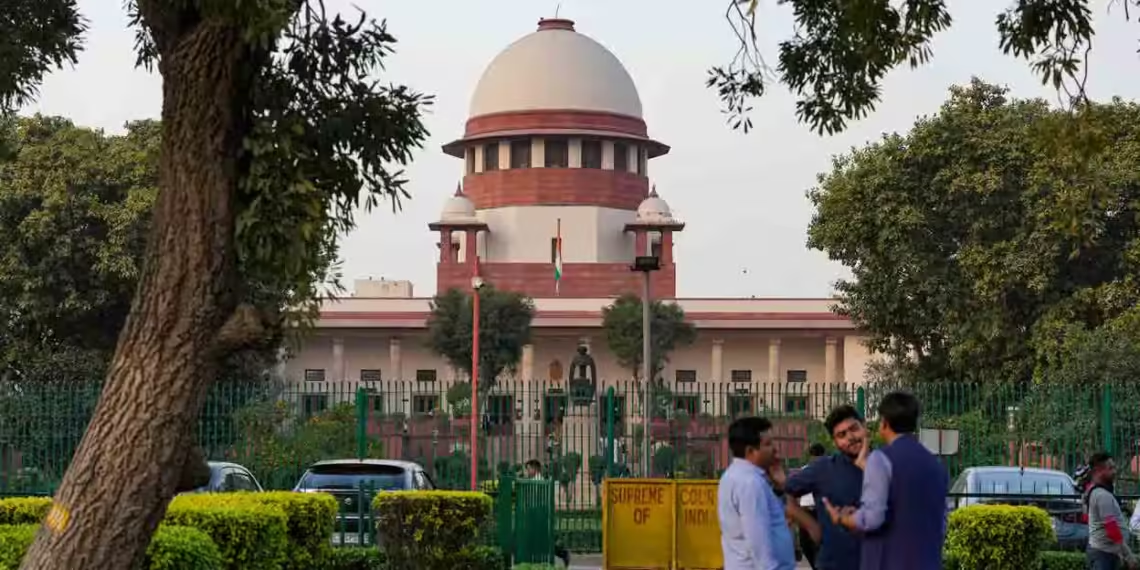The Court also stated that, with the approval of the state government, the Madrasa Board may implement regulations to ensure that recognized minority institutions deliver secular education of a requisite standard without diminishing their religious character.
PC BUREAU
New Delhi: In a landmark judgment, the Supreme Court on Tuesday upheld the constitutional validity of the Uttar Pradesh Board of Madarsa Education Act, 2004. However, the Court struck down provisions that allowed the Board to award higher degrees such as Fazil and Kamil.

A three-judge bench led by Chief Justice D.Y. Chandrachud ruled that these provisions were inconsistent with the University Grants Commission (UGC) Act, 1956, which governs higher education standards in India.
Key Points of the Judgment:
- Upholding the Madarsa Act: The Court upheld the core provisions of the Act, which aim to regulate the standard of education in recognized madrasas.
- Striking Down Higher Degree Provisions: The Court ruled that the Board’s authority to award higher degrees was beyond its legislative competence and conflicted with the UGC Act.
- Balancing State Interest and Minority Rights: The Court emphasized the need to balance the state’s interest in ensuring quality education with the rights of minority communities to administer their educational institutions.
- State’s Role in Regulating Madarsa Education: The Court clarified that the state has the power to impose regulations to maintain educational standards in madrasas, but these regulations must not undermine the minority character of these institutions.
Implications of the Judgment:
- Impact on Madarsa Education: The judgment affirms the state’s role in improving the quality of education in madrasas.
- Clarity on the Scope of State Intervention: The Court has provided a clear framework for the state’s intervention in minority educational institutions.
- Potential for Further Legal Challenges: While the judgment provides significant clarity, it may lead to further legal challenges and debates regarding the balance between state regulation and minority rights.
Chief Justice Chandrachud stated that the Madrasa Act primarily aims to regulate educational standards within Madrasas recognized by the Board, aligning with the state’s duty to ensure that students acquire essential skills to participate in society and earn a livelihood. He emphasized that Article 21A of the Constitution and the Right to Education (RTE) Act must be interpreted alongside the rights of religious and linguistic minorities to manage educational institutions of their choice.
Joined by Justices J.B. Pardiwala and Manoj Misra, the bench clarified that while the state legislature has the authority to regulate Madrasa education through the Act, it cannot extend to conferring higher degrees like Fazil and Kamil, as these fall under the UGC Act’s jurisdiction. Any attempt by the state to regulate higher education must comply with national standards established by the UGC Act, which supersedes state legislation in matters of advanced education.
Also Read: Rising Southern Firebrand: Pawan Kalyan’s Hindutva push Shakes Andhra political landscape
The Court also stated that, with the approval of the state government, the Madrasa Board may implement regulations to ensure that recognized minority institutions deliver secular education of a requisite standard without diminishing their religious character.
In response to the Allahabad High Court’s assertion that the Act violated secular principles, the Supreme Court clarified that a law can only be struck down if it violates specific constitutional provisions or exceeds the legislature’s authority. The bench argued that the basic structure doctrine, while fundamental, does not independently serve as grounds for invalidating a statute. Instead, for a law to be deemed unconstitutional due to a breach of secularism, it must specifically contravene provisions of the Constitution that establish secular principles. The Court stated that the High Court erred in presuming that a perceived breach of the basic structure could automatically invalidate the statute.
The Court further emphasized that while minorities have the right to establish and administer their educational institutions, this right is not absolute. The state has a vested interest in ensuring the quality of education in these institutions and may impose reasonable regulations for their recognition and support. According to the ruling, the Constitution allows the state to balance two goals: preserving the autonomy of minority-run institutions and maintaining educational excellence within them.
The Court concluded that the Madrasa Act is reasonable in its provisions, as it seeks to enhance the educational standards of students in recognized Madrasas, making them eligible to sit for board examinations and pursue further education. By setting standards for curricula, teacher qualifications, and other academic factors, the Act helps equip students with essential skills, contributing to their effective societal participation and economic independence. The Court held that the Act aligns with the state’s obligation to support educational quality, ensuring that students in Madrasas achieve a level of competency that can enhance their future prospects.

The Supreme Court’s decision is likely to have a significant impact on the future of madrasa education in Uttar Pradesh and could set a precedent for other states with similar legislation.













